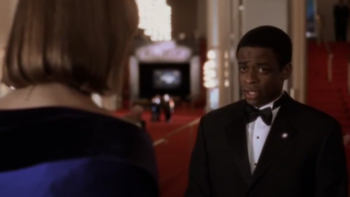 By Bob Hulteen
By Bob Hulteen
I’m a communications director. I’ve previously been employed by faith-based nonprofits, and now I work on messaging for the synod – telling the synod’s story in a light that is accessible and relatable. Often it involves discerning the optimal angle from which to view a situation. I’m fully aware that most people call this “spin.”
Whenever I talk with folks in the church, I go to my most authoritative source: The West Wing – you know, the show starring Martin Sheen. But, first, let’s take a look at the Bible. In fact, let’s consider this week’s Revised Common Lectionary reading: For the Seventeenth Sunday after Pentecost, the gospel reading is Mark 8:27-38. Let’s take a quick look at the middle section, just after Jesus asks his crew, while in Caesarea Philippi, what people are saying about him:
“[Jesus] began to teach them that the Son of Man must undergo great suffering, and be rejected by the elders, the chief priests, and the scribes, and be killed, and after three days rise again. He said all this quite openly. And Peter took him aside and began to rebuke him.”
Well, first, wow on Peter. That took some “courage” to rebuke Jesus.
“The theology of the cross calls us to do better than spin.”
Second, I can almost imagine what Peter said. Or, at least, I can imagine what I would have said. “Hey, Jesus. You know, we’ve been doing pretty well lately. The crowds are growing. And, I don’t know if you know this, Jesus, but talking about being rejected and suffering and dying doesn’t really sell well. Could we try something a little more uplifting? How about if you just say, ‘There, of course, will be challenges ahead, but don’t worry, all will be good in the end.’ I think folks might go for that more.”
It’s all about how you sell it. It’s all about the spin.
OKAY, NOW LET’s ALL be reminded of The West Wing. (At least, I hope this is a reminder of a particular episode. Everyone should have watched the entire series – multiple times – by now.)
The tension in this Year 2000 episode (or the side-tension to relieve a little of the tension from the primary motif) centers around Charlie, President Bartlet’s personal assistant, telling a reporter from Oregon that the President doesn’t like green beans.

Charlie and CJ discuss President Bartlet’s dislike of green beans in an episode of The Wing Wing.
What’s the big deal with that? Press Secretary C.J. Cregg reminds Charlie that Bartlet only won the state of Oregon by 10,000 votes in the previous election, and things aren’t looking great in the re-election campaign at the moment. The campaign needs Oregon’s Electoral College votes.
“‘Education is a serious thing. Crime, jobs, national security.’”
The White House senior staff goes into uber mode trying to figure out how to spin Charlie’s offhand comment. (Yeah, it’s a little disconcerting to think that the brightest minds in government could devote a good bit of time to “spinning” the fact that the Commander-in-Chief doesn’t like green beans.)
If you want to watch snatches of this episode from the greatest TV drama of all time, go here and here.
JESUS WASN’T SO interested in spin. He knew that his vocation of bringing good news to the poor would have a certain inevitability about it; he was aware that the language he used was challenging. But, he didn’t sugarcoat what he was asking of his disciples – neither the ones with the capital D nor all those small d folks who followed. (Neither of those stand for Democrats, btw; both are about disciples.)
Jesus warned Peter to reconcile his fear of the future with the vision of God’s redemption of creation within Godself. Peter’s own insecurity should not and could not deter Jesus from inevitable confrontation. The theology of the cross calls us to do better than spin. It calls to do go places we never anticipated. It calls us to care deeply about our struggling neighbors.
“And Peter took [Jesus] aside and began to rebuke him.”
So, Charlie from The West Wing offers a word of wisdom in the aforementioned episode: “Education is a serious thing. Crime, jobs, national security.” The things that affect people’s lives directly are way more serious topics than favorite (or least favorite) foods.
With a federal vote on the horizon (much like our current reality), C.J. states that “everyone is stupid in an election year.” Charlie responds, “No, everyone gets treated like they’re stupid in an election year, C.J.”
As our election-based anxiety is high, let’s try to keep our spin in check. The truth just might be the most powerful story of all to tell.
